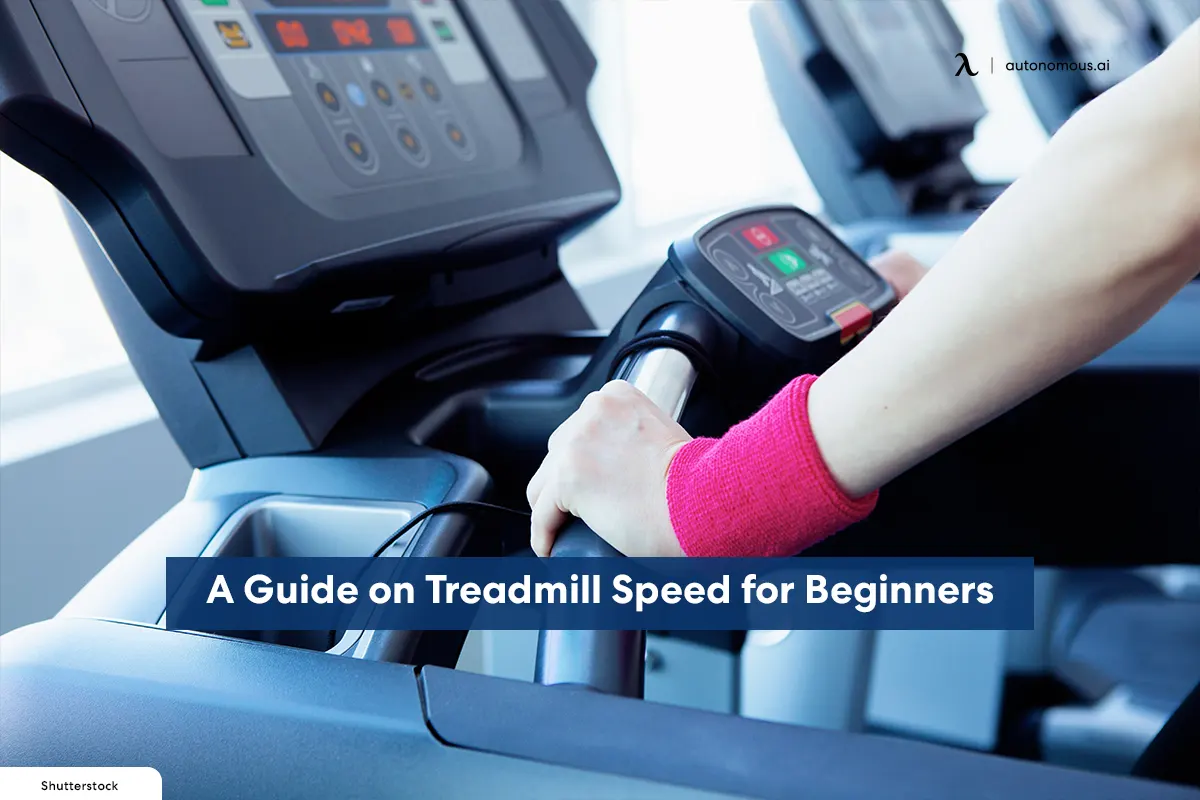
Table of Contents
You see those exciting workout videos online and get the right motivation to work out as you see people running in cool shoes and sporty clothes on a treadmill. On the first day at the gym, you see many buttons and features on a treadmill and multiple treadmill speeds; then, you get confused about the core.
While gyms educate regarding treadmill speed to pace and all the features, one should learn about the basics, especially if they have a small treadmill for home. That being said, the effectiveness of a treadmill workout also depends on the average treadmill speed, its setting, and the type of workout you wish to perform on the fitness equipment. While you might still be a noob about treadmill speed, this article will enlist our top tips for acing the treadmill workout at home and getting the most out of it.
Treadmill Speed for Varying Workouts
A beginner's treadmill workout can be the basis for a reliable go-to routine and a terrific introduction to exercise equipment. In addition to warming up your muscles, it will also make you more at ease in the gym, which is a reason to rejoice!
The following advice will help you plan your next workout if you're unsure how to use the slope and speed settings on the treadmill (or how to determine your pace).
Treadmill Speed for Beginners
If you are a beginner with a treadmill, the best way is to start walking. As you take it slow, there is no extra load on your knees, back, and the entire body hence the chances of developing muscle soreness is close to zero. For a beginner treadmill speed, the best rating begins around three mph. As this speed lets you build momentum and makes you used to walking on the treadmill track, you can gradually increase the speed as you please.
| Activity | Speed (mph) | Speed (km/h) | Description |
|---|---|---|---|
| Walking | 2.5 - 3.0 | 4.0 - 4.8 | Start at a comfortable walking speed |
| Jogging | 4.0 - 4.5 | 6.4 - 7.2 | Jog for short intervals after building endurance |
| Running | 5.0 - 6.0 | 8.0 - 9.6 | Start with short intervals, gradually increase duration |
Treadmill Speed for Jogging
The transition between walking and running is made by jogging. Your arms are starting to pump, and your feet are rising above the level of a walk. However, you will be able to carry on a normal conversation with someone who is jogging next to you. The average jogging speed for a person is between 4 and 6 miles per hour.
| Step | Speed (mph) | Speed (km/h) | Description |
|---|---|---|---|
| Warm Up | 3.0 - 4.0 | 4.8 - 6.4 | Start with a 5-minute walk |
| Jogging | 4.5 - 5.5 | 7.2 - 8.8 | Find your comfortable jogging pace |
| Cool Down | 3.0 - 4.0 | 4.8 - 6.4 | Finish with a 5-minute walk |
Treadmill Speed for Running
Depending on one's level of fitness, the length of one's legs, and the shape of their body, different people run at different speeds. A longer, smoother stride and greater arm pumping set it apart from jogging. You won't be able to talk to someone sprinting next to you while you're moving. So, make sure to leave that chatty hormone at home when you plan to run on a treadmill. The typical speed for running on a treadmill is between 6 and 10 miles per hour.
| Factor | Speed (mph) | Speed (km/h) | Description |
|---|---|---|---|
| Beginners | 6.0 - 7.0 | 9.6 - 11.2 | Start at the lower end of the range |
| Experienced | 7.0 - 8.0+ | 11.2 - 12.8+ | Push towards higher speeds |
| Intervals | Varies | Varies | Varying speeds for speed training |
Treadmill Speed by Age
| Age Group | Walking Speed (mph) | Jogging Speed (mph) | Running Speed (mph) |
|---|---|---|---|
| Children and Teens | 3.0 - 4.0 | 4.0 - 6.0 | 6.0 - 8.0 |
| Adults (19-40 years) | 3.5 - 4.5 | 5.0 - 6.5 | 6.5 - 8.0+ |
| Middle-Aged Adults | 3.5 - 4.5 | 4.5 - 6.0 | 6.0 - 7.5 |
| Seniors (61+ years) | 2.5 - 3.5 | 3.5 - 4.5 | Up to 6.0 |
Average Treadmill Speed by Age (in km/h)
| Age Group | Walking Speed (km/h) | Jogging Speed (km/h) | Running Speed (km/h) |
|---|---|---|---|
| Children and Teens | 4.8 - 6.4 | 6.4 - 9.6 | 9.6 - 12.8 |
| Adults (19-40 years) | 5.6 - 7.2 | 8.0 - 10.4 | 10.4 - 12.8+ |
| Middle-Aged Adults | 5.6 - 7.2 | 7.2 - 9.6 | 9.6 - 12.0 |
| Seniors (61+ years) | 4.0 - 5.6 | 5.6 - 7.2 | Up to 9.6 |
The average treadmill speed for the 40s and 50s should be no more than 3.5 and 3 mph, respectively. This decrease in speed minimizes knee friction, keeping the joints in the body secure, which become weaker as you grow old. Though this speed also varies from treadmill to treadmill, modern WalkingPad treadmills have better-developed features to minimize friction and strain on knees.
Average Speed for A Curved Treadmill
A curved treadmill is specially used by athletes who aim to build muscles, such as football players and runners. A curved treadmill has a curved running deck that you can use for walking and running as the belt is propelled behind you with each step.
Treadmills with curves don't require electricity or a motor. The movement of your body propels the belt. Speed is the only distinction between a motorized treadmill and a curved treadmill, other than the latter's distinctive form.
On conventional, powered treadmills, you just set the pace and incline manually before starting your workout. However, when working out on a curved treadmill, you'll need to automatically adjust your speed to the machine's and your body's curvature. You'll continue moving as long as your legs can maintain the speed. Elite runners have reportedly reached over 24 mph. That's quick. quickly
Treadmill Speed for Weight Loss
Now we are talking. 90% of people use the treadmill for weight loss or any workout equipment to lose some weight. After all, what other reason motivates us to work out than seeing ourselves best in shape? And weight loss with the treadmill is indeed possible and highly effective. If you plan to lose weight on a treadmill, it is ideal for working with a fitness tracker to record your movements and monitor your calorie burn rate.
To lose weight, set the treadmill at two mph flat initially. As you warm up for 5-7 minutes, gradually increase the incline and speed to 6 mph. Then keep increasing the incline by 1 percent every minute until you reach a 10% incline. As you jog, increase the speed to 8 mph, and remember not to run on a treadmill too much at a time.
Determine the Workout Time
As you work out on a treadmill, the time you spend on workout also plays a vital role in weight loss. In particular, when it comes to keeping your speed, knowing how long you plan to sweat before starting your program is advised. You'll optimize your effort and get the most out of your beginner treadmill workout if you do it this way.
You might push yourself harder than you would if you were hoping to complete a 30-minute treadmill workout while doing a five-minute warm-up, five-minute workout, and five-minute cool-down.
Understanding treadmill speeds in terms of specific goals or time achievements can help you set and reach your fitness targets more effectively. Here are explanations for various treadmill speeds based on different workout goals:
Speed Conversions
| Goal | Distance | Time | Treadmill Speed (mph) | Treadmill Speed (km/h) |
|---|---|---|---|---|
| 1.5 miles in 15 minutes | 1.5 miles | 15 min | 6.0 mph | 9.6 km/h |
| 5K in 30 minutes | 3.1 miles | 30 min | 6.2 mph | 10.0 km/h |
| 10 minute mile | 1 mile | 10 min | 6.0 mph | 9.6 km/h |
| 9 minute mile | 1 mile | 9 min | 6.7 mph | 10.8 km/h |
| 7 minute mile | 1 mile | 7 min | 8.6 mph | 13.8 km/h |
| 3 miles in 30 minutes | 3 miles | 30 min | 6.0 mph | 9.6 km/h |
| 3.8 speed on treadmill | - | - | 3.8 mph | 6.1 km/h |
| 4.0 treadmill speed | - | - | 4.0 mph | 6.4 km/h |
| 5K in 40 minutes | 3.1 miles | 40 min | 4.65 mph | 7.5 km/h |
| 8 minute mile | 1 mile | 8 min | 7.5 mph | 12.0 km/h |
Treadmill Speed to Pace Conversion Table
Converting treadmill speed to pace can help you understand how your treadmill workout translates to outdoor running. Here is a table that shows the conversion from speed in miles per hour (mph) to pace in minutes per mile, and speed in kilometers per hour (km/h) to pace in minutes per kilometer.
| Speed (mph) | Pace (min/mile) | Speed (km/h) | Pace (min/km) |
|---|---|---|---|
| 3.0 | 20:00 | 4.8 | 12:30 |
| 3.5 | 17:08 | 5.6 | 10:42 |
| 4.0 | 15:00 | 6.4 | 9:22 |
| 4.5 | 13:20 | 7.2 | 8:20 |
| 5.0 | 12:00 | 8.0 | 7:30 |
| 5.5 | 10:55 | 8.8 | 6:49 |
| 6.0 | 10:00 | 9.6 | 6:15 |
| 6.5 | 9:14 | 10.4 | 5:46 |
| 7.0 | 8:34 | 11.2 | 5:21 |
| 7.5 | 8:00 | 12.0 | 5:00 |
| 8.0 | 7:30 | 12.8 | 4:41 |
| 8.5 | 7:03 | 13.6 | 4:25 |
| 9.0 | 6:40 | 14.4 | 4:10 |
| 9.5 | 6:19 | 15.2 | 3:57 |
| 10.0 | 6:00 | 16.0 | 3:45 |
| 10.5 | 5:43 | 16.8 | 3:34 |
| 11.0 | 5:27 | 17.6 | 3:24 |
| 11.5 | 5:13 | 18.4 | 3:15 |
| 12.0 | 5:00 | 19.2 | 3:07 |
How to Use the Table
- Find Your Speed: Locate your treadmill speed in either mph or km/h.
- Determine Your Pace: Read across to find the corresponding pace in minutes per mile or minutes per kilometer.
Warm Up
Warming up is necessary before any physical activity, but it's particularly crucial when a treadmill's inclination is to be increased. Increasing the slope, you may tilt the machine to simulate walking up a hill, which will work the muscles in your legs' backs.
Start on a treadmill without an elevation by warming up your muscles by walking. After your warm-up and inclined walk, get off the treadmill and give your hamstrings a nice stretch if you feel like it.
Stay connected with us!
Subscribe to our weekly updates to stay in the loop about our latest innovations and community news!
Interested in a Link Placement?
Spread the word
.svg)
.svg)





/https://storage.googleapis.com/s3-autonomous-upgrade-3/production/ecm/230914/bulk-order-sep-2023-720x1200-CTA-min.jpg)

/https://storage.googleapis.com/s3-autonomous-upgrade-3/production/ecm/230824/Amanda-8035f52a-7230-4c31-9bda-626fd7c392bf.jpg)